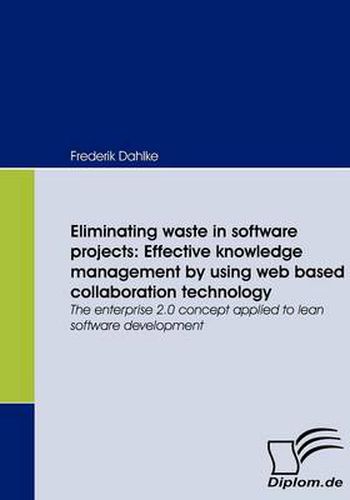Readings Newsletter
Become a Readings Member to make your shopping experience even easier.
Sign in or sign up for free!
You’re not far away from qualifying for FREE standard shipping within Australia
You’ve qualified for FREE standard shipping within Australia
The cart is loading…






This title is printed to order. This book may have been self-published. If so, we cannot guarantee the quality of the content. In the main most books will have gone through the editing process however some may not. We therefore suggest that you be aware of this before ordering this book. If in doubt check either the author or publisher’s details as we are unable to accept any returns unless they are faulty. Please contact us if you have any questions.
Knowledge management is controlling the transfer, distribution, and availability of knowledge. Traditionally, knowledge management processes are predefined; e.g. it is laid out in detail which document template, data structure, system, or work flow steps have to be used in order to manage knowledge. But knowledge management itself is complex. It is simply not possible to predefine the typical flow of work in knowledge intensive processes in advance. So rather than trying to determine the procedures it is more promising to analyze which factors can be used in order to control the outcome of the knowledge management process. By respecting the lean knowledge management principles, developed and first presented within this book, any manager can control the success of knowledge management in a lean software project any time. Enterprise 2.0 and Web 2.0 technologies perfectly support the lean knowledge management principles, and far better than any traditional approach, based on text processors, presentation software, spreadsheets, and E-Mail can do. Together, the lean knowledge management principles and Enterprise 2.0 form a new approach to knowledge management, which delivers value that can not be reached otherwise.
$9.00 standard shipping within Australia
FREE standard shipping within Australia for orders over $100.00
Express & International shipping calculated at checkout
This title is printed to order. This book may have been self-published. If so, we cannot guarantee the quality of the content. In the main most books will have gone through the editing process however some may not. We therefore suggest that you be aware of this before ordering this book. If in doubt check either the author or publisher’s details as we are unable to accept any returns unless they are faulty. Please contact us if you have any questions.
Knowledge management is controlling the transfer, distribution, and availability of knowledge. Traditionally, knowledge management processes are predefined; e.g. it is laid out in detail which document template, data structure, system, or work flow steps have to be used in order to manage knowledge. But knowledge management itself is complex. It is simply not possible to predefine the typical flow of work in knowledge intensive processes in advance. So rather than trying to determine the procedures it is more promising to analyze which factors can be used in order to control the outcome of the knowledge management process. By respecting the lean knowledge management principles, developed and first presented within this book, any manager can control the success of knowledge management in a lean software project any time. Enterprise 2.0 and Web 2.0 technologies perfectly support the lean knowledge management principles, and far better than any traditional approach, based on text processors, presentation software, spreadsheets, and E-Mail can do. Together, the lean knowledge management principles and Enterprise 2.0 form a new approach to knowledge management, which delivers value that can not be reached otherwise.